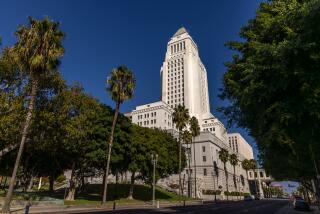Panel Offers Environmental Plan : Policy: Report is meant as a blueprint for Clinton and calls for linking economic, health pursuits. It urges new taxes, among them higher gasoline levy.
- Share via
WASHINGTON — After two years’ work, a blue-ribbon panel of business, government and science leaders said Friday that the United States must reject the “false dichotomy” of jobs versus environmental protection and adopt sweeping policy changes to link the pursuits of economic and environmental health.
Toward that end, the report of the National Commission on the Environment, being offered to President-elect Bill Clinton as a blueprint for his Administration, recommends the federal government adopt tax policies to stimulate “green” research and development.
It also calls for taxes on environmentally harmful activities, a more realistic means of calculating economic activity and the elimination of price-distorting subsidies. It says the United States should gradually and predictably increase gasoline taxes over a period of several years, enact a carbon tax to be phased in gradually and reduce or eliminate water subsidies to growers.
In its specifics, the commission’s recommendations are similar to many that environmentalists have previously supported in reports and conferences ranging from community meetings to last summer’s Earth Summit in Brazil.
But the work is apt to receive special attention in the new Administration because of the makeup of the panel, which was convened and funded by the World Wildlife Fund.
Chaired by former Environmental Protection Agency Administrator Russell E. Train, it included executives from such companies as Southern California Edison and Alcoa, along with officials and prospective appointees of the Clinton Administration. Among them were Alice Rivlin, newly named deputy director of the Office of Management and Budget, former Vermont Gov. Madeleine M. Kunin, a close Clinton adviser during both the campaign and transition, and James Gustave Speth, a Clinton adviser for the environment and natural resources.
Among its key recommendations, the commission said the United States should:
--Adopt tax credits or other research and development incentives to stimulate savings and investment in new environmental technologies.
--”Gradually and predictably” increase the federal tax on gasoline--by perhaps 20 cents a gallon annually for five years.
--Enact a carbon tax, starting at about $6 per ton and eventually reaching $30 per ton, to discourage the use of fossil fuels that cause serious pollution.
Despite the political influence of their proponents, some of the recommendations would appear to face a bleak future.
A prime example is the suggested increase in the federal gasoline tax. The concept was sharply opposed by Clinton when it was suggested by former Massachusetts Sen. Paul E. Tsongas during the Democratic presidential primaries and later by independent candidate Ross Perot.
Train conceded that it was “highly unlikely that either the Administration or Congress will jump to embrace our recommendation.”
It will take time, he added, “before the country at large or politicians are ready to bite that kind of a bullet.”
Train said he hopes the recommendations will be discussed during the economic summit in Little Rock, Ark., next week and will be the subject of congressional hearings early next year.
Unless there is official recognition of the major themes suggested by the commission, he added, the environment will decline and “life is going to become of increasingly low quality on this planet.”
“The choice between crisis and sustainable development,” the commission counsels, “is one that our nation shares with the rest of the world. It must be addressed through international cooperation and by U.S. commitment to action at home and leadership abroad.
“As the world’s single largest economy, the largest user of natural resources, the largest producer and consumer of energy, and the largest producer of carbon dioxide pollution, the United States has a special responsibility to exercise world leadership,” the panel said.
On the global front, the commission took special note of the problems caused by population growth--largely ignored by the Earth Summit and, in the view of many environmentalists, by the Bush Administration.
“The United States,” the report says, “must make a major commitment to cooperate with the world community to stabilize global population. . . . “
Specifically, it says the United States should dramatically increase its population-control assistance to developing nations where the problem is most acute, raising it from $650 million in the coming year to at least $1.2 billion annually by the turn of the century.
Further, it said, global environmental protection should become a priority in the shaping of both foreign and domestic policies.
The sweep of recommendations, Train said, addresses urgent matters that “are politically difficult and doubtlessly unpopular, but they have to be dealt with.”
More to Read
Get the L.A. Times Politics newsletter
Deeply reported insights into legislation, politics and policy from Sacramento, Washington and beyond. In your inbox twice per week.
You may occasionally receive promotional content from the Los Angeles Times.









